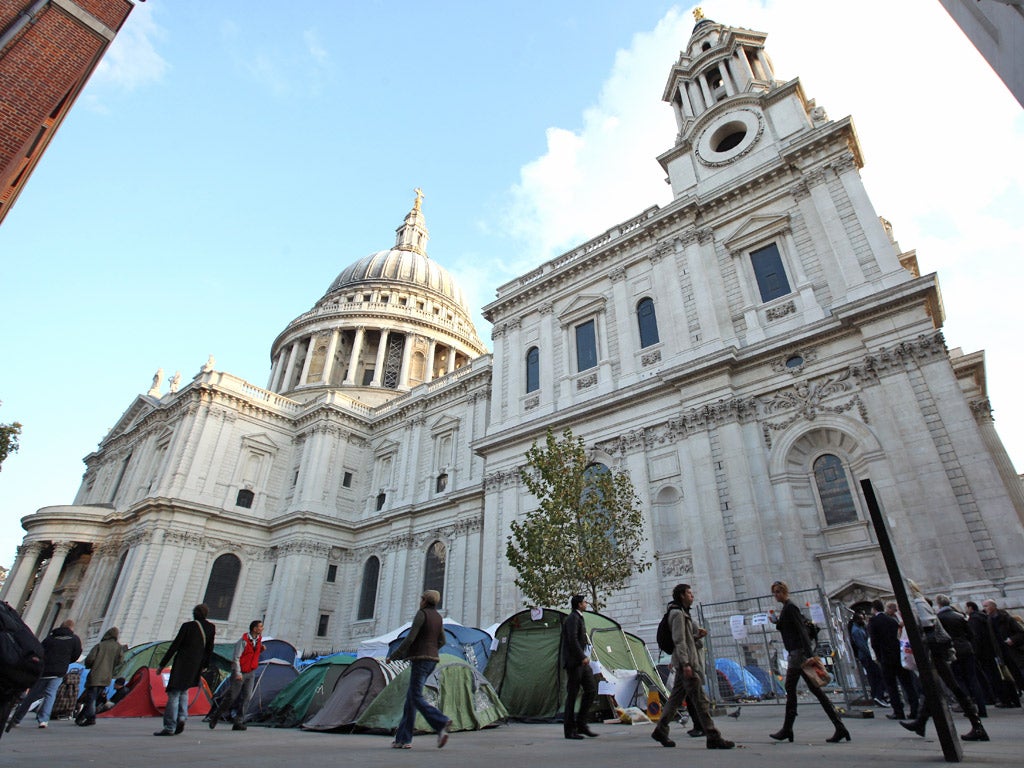U-turns at St Paul's but camps still worlds apart
Late changes of tack by the Church and the City of London have been welcomed by protesters occupying Paternoster Square. But the chances of an easy resolution to the stand-off remain slim

The Church of England yesterday attempted to extricate itself from the political and moral quagmire created by its handling of tensions between God and Mammon in the City of London when it announced it was abandoning legal action against anti-capitalist protesters who have set up camp outside St Paul's Cathedral.
Click to HERE view graphic
In a day of fast-moving developments in the fortnight-long stand-off between the demonstrators and the Square Mile's civil and ecclesiastical authorities, the Bishop of London and the cathedral's governing body staged a dramatic volte face by saying they wanted to engage "directly and constructively" with the protesters and would no longer seek an eviction order to clear the 200-tent camp.
The change of stance, which had previously seen the bishop, Richard Chartres, explicitly lend his support to legal action to end the protest, placed the cathedral on a collision course with the City of London Corporation. The municipal body, which owns much of the land surrounding St Paul's, later announced it had "paused" until today its own eviction proceedings.
Rowan Williams, the Archbishop of Canterbury, last night entered the eviction row by saying the Church of England had become an unwitting lightning conductor for societal discontent at the financial sector and it has a role to play in seeking solutions. Writing in the Financial Times, Dr Williams said: "The Church of England and the Church Universal have a proper interest in the ethics of the financial world and in the question of whether our financial practices serve those who need to be served – or have simply become idols that themselves demand uncritical service."
In a statement which amounted to an admission by the Church of England that it had mishandled its response to the arrival of the Occupy London Stock Exchange (OSLX) protest camp, Dr Chartres and the Chapter of St Paul's said a "unanimous" decision had been reached to focus on the "moral and ethical" issues raised by the demonstrators without the "threat of forcible eviction" by the cathedral.
The bishop, who is now in charge of the cathedral's response to the crisis following the resignation on Monday of its dean, the Right Reverend Graeme Knowles, announced that Giles Fraser, the former canon chancellor who resigned last week in protest at the eviction plans, would return to take part in an initiative aimed at "reconnecting the financial with the ethical". Dr Chartres has also invited Ken Costa, a senior City figure and a devout Christian, to take part in the project.
He said: "Alarm bells are ringing all over the world. St Paul's has now heard that call. Today's decision means the doors are most emphatically open to engage with matters concerning not only those encamped around the cathedral but millions of others in this country and around the globe."
Religious commentators and some clergy had hitherto underlined the difficulty faced by St Paul's because of its close relationship with the City. It has raised £40m in the past decade through charitable donations from banks and institutions including the City of London Corporation and the London Stock Exchange – both targets of the protesters.
Mary Singer, a spokesman for OSLX, said: "We are all very happy to see that the threat of court proceedings against the camp is being reviewed by the City. It is important that our right to protest is respected. As the Cathedral has agreed, the occupation is here to fight for a more just, democratic society."
The peacemaker? Ken Costa
If not God's banker, then Ken Costa is perhaps as close as the Square Mile comes to a godly banker. The South African-born financier had an unusual preparation for the City by studying theology at Cambridge.
He nonetheless rose to the highest echelons of the City, becoming vice-chairman of the Swiss bank UBS and chairman of Lazard International.
His devout Christianity has seen him become chairman of the Alpha Course, which introduces millions to the faith. But he has also highlighted the need for global capitalism to respond to growing popular anger, describing a "pressing need to reconnect the financial with the ethical" or "risk the consequences".
Join our commenting forum
Join thought-provoking conversations, follow other Independent readers and see their replies
Comments